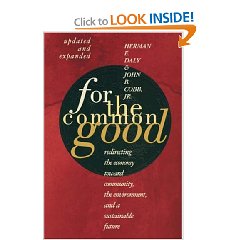Dr. Herman E. Daly may well be a future Nobel Prize winner …he is especially well-regarded in Norway and Sweden, where he has received prizes one step short of the Nobel. He is the author, co-author, or primary contributing editor of many books that fully integrate the disciplines of economics and ecology. I bought the three most recent for the purpose of selecting one to give out at my annual Global Information Forum. I ended up choosing this book to give away to hundreds, in part because it is available in paperback and is not a more expensive “trade” publication; and in part because it is strong in laying out specific ecological policy areas in the context of a strong theological or ethical perspective.
Of the three books I reviewed, (the newest Ecological Economics: Principles And Applications, the oldest, updated, Valuing the Earth: Economics, Ecology, Ethics) the first, the text-book, is assuredly the most up-to-date and the most detailed. If you are buying only one book for yourself, that is the one that I recommend, because these are important issues and a detailed understanding is required with the level of detail that this book provided. It should, ideally, be read with “Valuing the Earth” first (see my separate review of that book, from the 1970's updated with 1990's material and new contributions), then this book (“For the Common Good”), and finally the text book as a capstone. But if you buy only one, buy the text book.
This is a second-edition work, updated from the 1984 first edition. I like it very much in part because it comes across as less academic and more common-sense in nature. Part One does a lovely job of tearing apart the fallacy of misplaced concreteness with respect to economics, the market, measuring economic success, the reduction of the human to a “good” that can be traded without regard to humanity and ethics and community, and land. Part Two gently introduces the reader to the many distinguished thought-leaders and practitioners who have gradually matured the discipline of economics to embrace humanity, community, and sustainability as non-negotiable realities that cannot be ignored.
Part Three, a major factor in my choosing this book over the others for broad pro-bono distribution, addresses the specifics of policies one element at a time: free trade versus community; population; land use; agriculture; industry; labor; income policies and taxes; from world domination to national security as an objective. Finally, Part Four, without being corny or preachy, describes the religious or ethical vision (I still think the Golden Rule works as a one-sentence definition of common interest).
An afterword on debt in relation to money and wealth is particularly timely as the American public foolishly allows the White House carpetbaggers to run up a $7 trillion deficit that our great-grandchilden will never be able to pay off if we continue is these evil and irresponsible directions, all in sharp opposition to the sensible and ethical constructs in this book.
Of the three books, none of which really duplicate one another in any negative way, albeit with overlaps, this is the second that I recommend for purchase, after the textbook.
See also, with reviews, published since then:
The Battle for the Soul of Capitalism: How the Financial System Underminded Social Ideals, Damaged Trust in the Markets, Robbed Investors of Trillions – and What to Do About It
Natural Capitalism: Creating the Next Industrial Revolution
Green to Gold: How Smart Companies Use Environmental Strategy to Innovate, Create Value, and Build Competitive Advantage
Cradle to Cradle: Remaking the Way We Make Things





